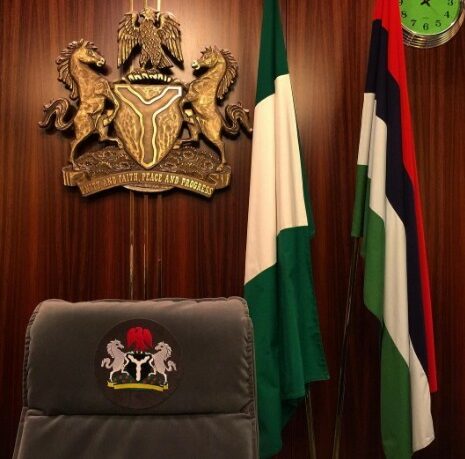By Gbenro Olajuyigbe
‘Society that separates its scholars from its warriors will have its thinking done by cowards and its fighting by fools’ – Thucydides
Contestation for power, particularly, the question of who occupies the presidential seat has become the albatross of Nigeria’s diversity management, causing disaffections among ethnic blocks and sabotaging hope for unity. Politics in Nigeria has been chaotically driven by ethnicity. Worse still, governance has been a subject of ethnic debate, exclusion and unjust patronage, leading to the collapse of ethics and failure in all aspects of national endeavours.
Injustice fueling insecurity in Nigeria – Ex-minister
FG directs Telcos to bar calls on unlinked lines
Dared with the failure of nation building and faced with an angry and perhaps, hungry population of near 200 million people who are deeply worried about their future in their own country, there is a need to pull out a new strategy for stabilisation, a converging model that is close to a conception on what inclusive presidency should look like.
We have a country crippled by corruption, nepotism and leadership irresponsibility. The index cause can be traced to how the leaders emerged and the infectious crude mediocre governance model obtainable now treats power as who gets what determines the clans that have access to opportunities and resources.
Many governments have moved along this vicious circle of failures that has become a national affliction and burden in all spheres of endeavors. There is no worse assault on the notion of oneness than allowing parts of the whole to remain perpetually mutually suspicious of one another because of exclusion.
Hence, I hereby propose Collegiate Presidency as a model for stabilisation. Collegiate Presidency Model is an all-inclusive presidential governance system in which all the six geo-political zones and the Federal Capital Territory have a representative each in a 6-member collegiate Presidency with a single term of six years. It is a power-sharing model in which all the geo-political zones in Nigeria are represented in a Presidential Collegiate at the same time, with each zone presiding over the collegiate for a year. The six members would have become the president before the cycle is completed in six years. Nevertheless, they bear collective responsibility for their actions and inactions. The model is a fusion of presidential and parliamentary systems of government.
The model has constitutional implications. It calls for Shared Values and collective responsibility. It will trigger new technical demands on leadership qualifications and recruitment process as well as extracting commitment and behavioral modification from citizens. To carry on with this proposal, a fundamental Constitutional amendment is required. Areas of the Constitution that spelt out requirements for election into the offices of the president and the vice president, duties, obligations and prerogatives must be reviewed. Since the election of the Presidential Collegiate Members will be zone-based, electoral laws and the relevant aspects of the Constitution must be amended. Another implication of the proposal is that more than one political party could form the Collegiate; hence, structural reforms of the political party system might be necessary.
Clarity of vision is expected in this proposal. While the proposal does not pretend to be the all-purpose solution to Nigeria’ s seemingly intractable problems, it’s a veritable breaker to the centrifugal forces that have been dispensing ethnic-related political conflict in Nigeria. A country that is struck by the arrow of ethnic division like Nigeria has a fractured future. It is clearly difficult to expect sustainable development in such a situation. This proposal pen a new vista for people to come together to own a system through which they can collectively chart a new future built on justice and equity for themselves. Faced with a common future created by this new order, people will be willing to work together to see through new strategy for social and economic development. This new working system can be extended to other areas of development concerns on a much broader basis to address the disunity and mutual hate that have permeated the polity. While it could be difficult to characterise the new culture that would emerge from this cooperative model, it can be argued that it will catalyse structural, institutional and system reforms that could accelerate development.
If accepted, we may even change the name; the Federal Republic of Nigeria to the People’s Republic of Nigeria to reflect the new model or even for symbolism of change. We must build a people-owned and people-centered government, driven by inclusive philosophy of sustainable development goals- leaving no one behind.
The solution must be adoptable or at least adaptable; most importantly, acceptable. Hence, an inclusive National Summit is imperative to work out guidelines for implementing this proposal as well as proffering solutions to problems besetting a country mutually frozen by fears of ethnic, religious and even political hegemony. Solutions to our challenges must accommodate these fears. Hence, we must approach the challenges as human and technical problems that need human and technical solutions. Nigeria’s challenges are so complex that no matter how laudable the solutions proffered, if it is not collectively initiated and owned, they will be frustrated by suspicious and mutual hostility.
We must initiate processes of continuous dialogue in all other facets of our national life as a way of building consensus, trust and cohesion. We may even decide to decentralise processes of dialogue to sub nationals so as to enhance the opportunity to understand one another’s views and perspectives, all ingredients required to manage diversity and build a virile nation.
We cannot afford a nation where injustices continue to push people to search desperately for identity and clan refuge. It is dangerous to leave the interpretation of citizenship to callous subjectivists who are dressed in borrowed clothes of patriots simply because they occupy space in forms of political offices.
In conclusion, the collegiate Presidency will provide ammunition to wage war against belligerent social dislocation, economic mismanagement and political topsy-turvy that have oiled conflict and underdevelopment in Nigeria. It will drastically alter how people of different ethnic groups relate to one another. It will trigger cooperation, explore advantages of lateral integration and reduce costs and consequences of friction. The model carries with it an indescribably new system that will challenge social injustice, reduce ethnic tensions and promote political-economic system that falls in line with progress principles. It might not throw all Nigeria’s problems out of the window. What is certain is that it will revolutionise our nationalism and redesign structure that reconstitutes citizenship, discard exclusion and mobilise for national integration – all, ingredients needed for enduring civilization and sustainable development!
Olajuyigbe is the Executive Director of Emergency & Risk Alert Initiative

 Join Daily Trust WhatsApp Community For Quick Access To News and Happenings Around You.
Join Daily Trust WhatsApp Community For Quick Access To News and Happenings Around You.


